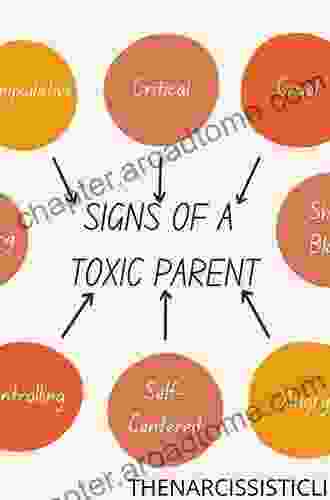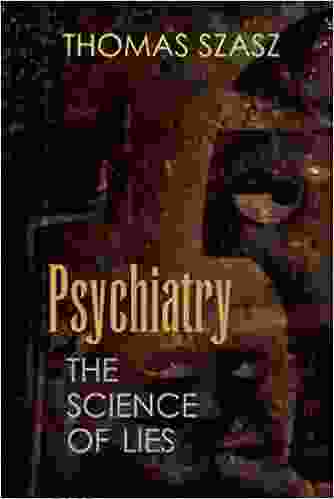Psychiatry: The Science of Lies

Psychiatry is a branch of medicine that deals with the diagnosis and treatment of mental illness. It is a relatively new field, with most of its development occurring in the last 150 years. Despite its recent origins, psychiatry has become one of the most powerful and influential forces in modern society.
Psychiatry has been used to justify everything from war to torture to the imprisonment of political dissidents. It has also been used to create a lucrative industry for pharmaceutical companies, who profit from the sale of psychiatric drugs.
4.2 out of 5
| Language | : | English |
| File size | : | 1537 KB |
| Text-to-Speech | : | Enabled |
| Screen Reader | : | Supported |
| Word Wise | : | Enabled |
| Print length | : | 148 pages |
The problem with psychiatry is that it is not a science. It is based on subjective criteria and has no objective way to measure mental illness. This makes it easy for psychiatrists to diagnose and treat whatever they want. And because psychiatry is so powerful, it can be used to control and suppress dissent.
In his groundbreaking book, Psychiatry: The Science of Lies, Dr. Peter Breggin exposes the shocking truth about psychiatry. He shows how psychiatry is a pseudoscience that has been used to control and suppress dissent for centuries.
Dr. Breggin is a psychiatrist who has been practicing for over 40 years. He has seen firsthand the damage that psychiatry can do. He has also seen how psychiatry has been used to justify some of the most heinous crimes against humanity.
In Psychiatry: The Science of Lies, Dr. Breggin provides a devastating critique of psychiatry. He shows how psychiatry is based on false assumptions and how it has been used to justify some of the most horrific crimes against humanity.
Dr. Breggin's book is a must-read for anyone who wants to understand the dangers of psychiatry. It is a powerful indictment of a corrupt and dangerous industry.
The Dangers of Psychiatry
Psychiatry is a dangerous field. It is based on false assumptions and has no objective way to measure mental illness. This makes it easy for psychiatrists to diagnose and treat whatever they want. And because psychiatry is so powerful, it can be used to control and suppress dissent.
Here are some of the dangers of psychiatry:
- Psychiatry can be used to justify anything. Because psychiatry is based on subjective criteria, it can be used to justify any behavior, no matter how heinous. For example, psychiatry has been used to justify war, torture, and the imprisonment of political dissidents.
- Psychiatry can be used to control and suppress dissent. Because psychiatry is so powerful, it can be used to silence anyone who disagrees with the status quo. For example, psychiatry has been used to suppress dissent in the Soviet Union, China, and other totalitarian regimes.
- Psychiatry can be used to create a lucrative industry for pharmaceutical companies. Pharmaceutical companies profit from the sale of psychiatric drugs. They have a vested interest in keeping psychiatry alive and well, even if it means harming patients.
The Truth About Mental Illness
Mental illness is not a disease. It is a normal human response to stress and trauma. Mental illness is often caused by poverty, discrimination, abuse, and other social factors.
The best way to treat mental illness is to address the underlying causes. This means providing people with the resources they need to cope with stress and trauma. It also means changing the social conditions that contribute to mental illness.
Psychiatry does not offer a real solution to mental illness. It only offers a way to control and suppress those who are suffering.
Psychiatry is a pseudoscience that has been used to control and suppress dissent for centuries. It is a dangerous field that has no place in a free and democratic society.
If you or someone you know is struggling with mental illness, please seek help from a qualified mental health professional. There are many effective treatments available that can help you get your life back on track.
4.2 out of 5
| Language | : | English |
| File size | : | 1537 KB |
| Text-to-Speech | : | Enabled |
| Screen Reader | : | Supported |
| Word Wise | : | Enabled |
| Print length | : | 148 pages |
Do you want to contribute by writing guest posts on this blog?
Please contact us and send us a resume of previous articles that you have written.
 Book
Book Novel
Novel Page
Page Chapter
Chapter Text
Text Story
Story Genre
Genre Reader
Reader Library
Library Paperback
Paperback E-book
E-book Magazine
Magazine Newspaper
Newspaper Paragraph
Paragraph Sentence
Sentence Bookmark
Bookmark Shelf
Shelf Glossary
Glossary Bibliography
Bibliography Foreword
Foreword Preface
Preface Synopsis
Synopsis Annotation
Annotation Footnote
Footnote Manuscript
Manuscript Scroll
Scroll Codex
Codex Tome
Tome Bestseller
Bestseller Classics
Classics Library card
Library card Narrative
Narrative Biography
Biography Autobiography
Autobiography Memoir
Memoir Reference
Reference Encyclopedia
Encyclopedia Sri Srimad Bhaktivedanta Narayana Gosvami...
Sri Srimad Bhaktivedanta Narayana Gosvami... Michael Owen
Michael Owen Prof Dr P V Lakshmipathy
Prof Dr P V Lakshmipathy Suman Deb Roy
Suman Deb Roy Susan Stefan
Susan Stefan Nick Shackleton Jones
Nick Shackleton Jones Nicoletta Leonardi
Nicoletta Leonardi Michael J Lambert
Michael J Lambert Ngugi Wa Thiong O
Ngugi Wa Thiong O Laura Barnett
Laura Barnett Scott Mitchell
Scott Mitchell Michael Camille
Michael Camille Naresh Khatri
Naresh Khatri Mitch Glaser
Mitch Glaser Nicole Dennis Benn
Nicole Dennis Benn Nancy Colier
Nancy Colier Nicola P Wright
Nicola P Wright Raul Meza
Raul Meza Victor Wu
Victor Wu Peter R Lord
Peter R Lord
Light bulbAdvertise smarter! Our strategic ad space ensures maximum exposure. Reserve your spot today!
 Nathaniel PowellFollow ·10.3k
Nathaniel PowellFollow ·10.3k Steve CarterFollow ·19.1k
Steve CarterFollow ·19.1k Felix HayesFollow ·15.1k
Felix HayesFollow ·15.1k Chuck MitchellFollow ·8.5k
Chuck MitchellFollow ·8.5k Foster HayesFollow ·7.6k
Foster HayesFollow ·7.6k Christian BarnesFollow ·9.5k
Christian BarnesFollow ·9.5k Paulo CoelhoFollow ·15.8k
Paulo CoelhoFollow ·15.8k Calvin FisherFollow ·2.8k
Calvin FisherFollow ·2.8k

 Samuel Beckett
Samuel BeckettPortrait of the Plague Doctor: A Chilling Tale of Fear...
Prologue: A...

 Elliott Carter
Elliott CarterTrends in Modeling and Simulation Studies in...
Unveiling the Convergence of...

 Natsume Sōseki
Natsume SōsekiCells For Kids: Science For Children
Unlock the Microscopic...

 Anthony Wells
Anthony WellsUnlock the Power of Understanding: Embrace the African...
Embark on a Journey of Truth,...

 Forrest Reed
Forrest ReedBreaking Free: Healing from Toxic Relationships Between...
Are you struggling...
4.2 out of 5
| Language | : | English |
| File size | : | 1537 KB |
| Text-to-Speech | : | Enabled |
| Screen Reader | : | Supported |
| Word Wise | : | Enabled |
| Print length | : | 148 pages |














